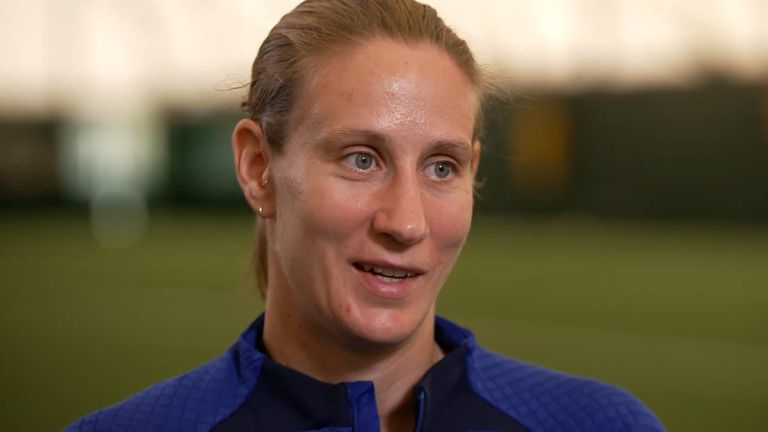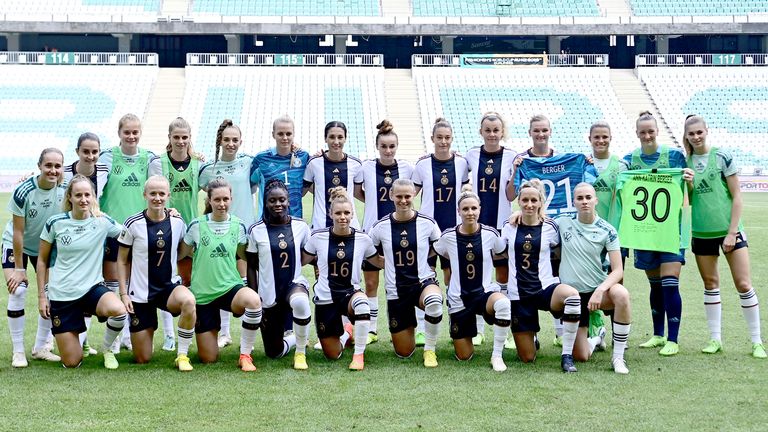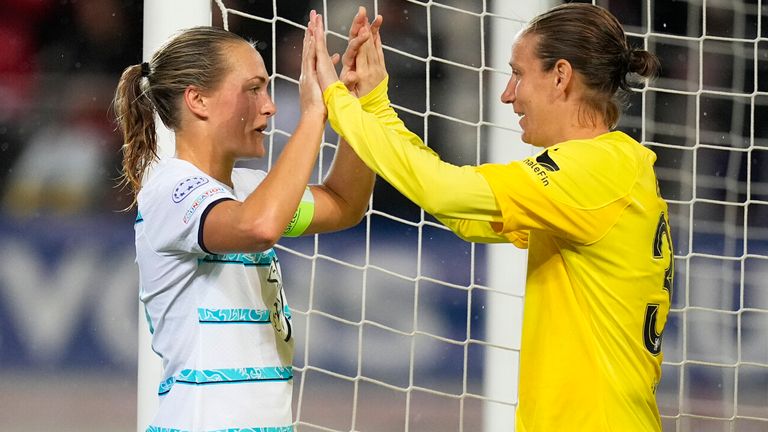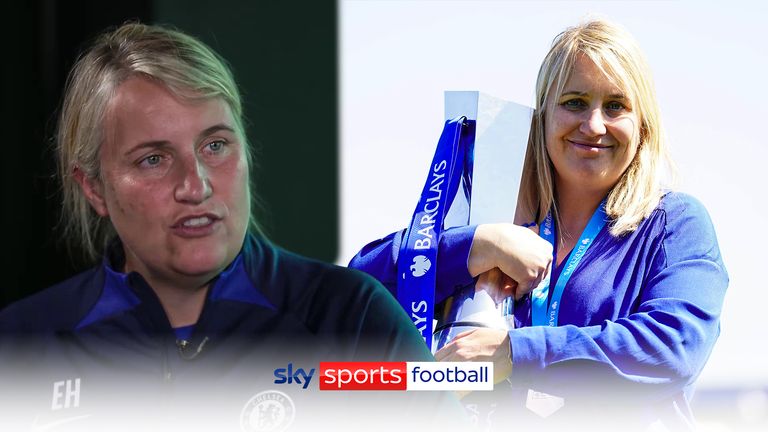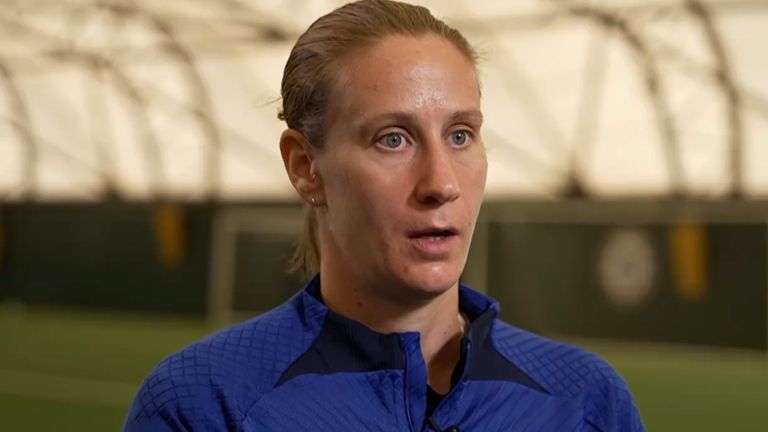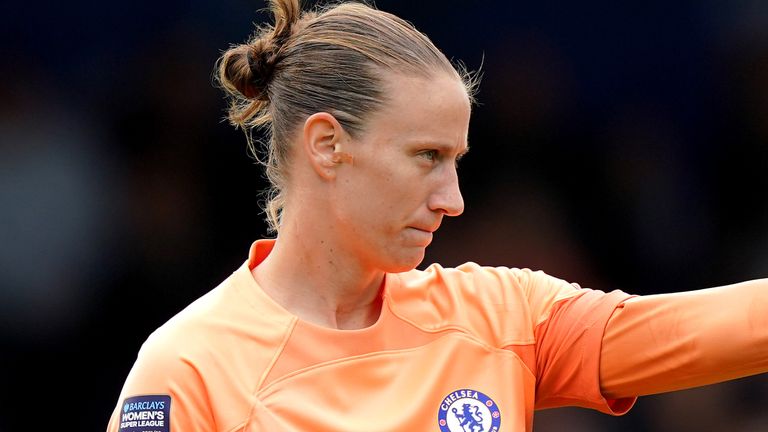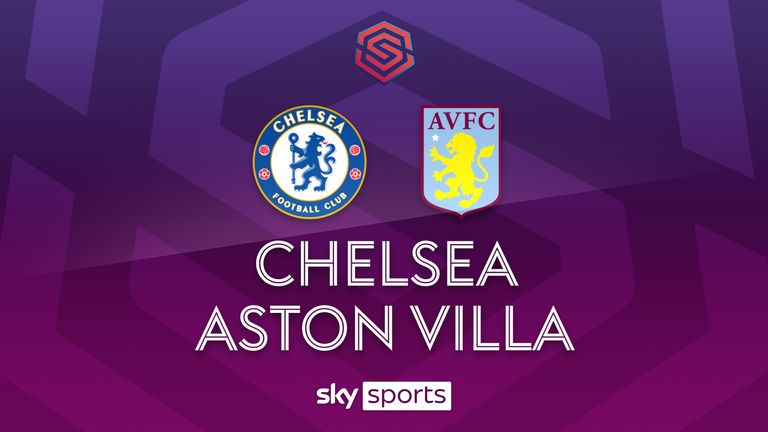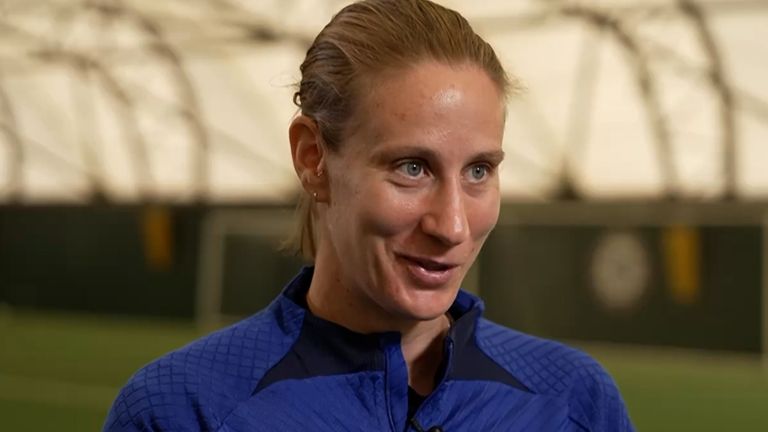Chelsea Women goalkeeper Ann-Katrin Berger on her thyroid cancer return and how football saved her
Ann-Katrin Berger: "I've started to realise I can help other people and actually reach a big platform as well"; Watch the full and exclusive interview with the Chelsea goalkeeper on Inside the WSL on Thursday at 6.30pm on Sky Sports Football
Thursday 3 November 2022 22:00, UK
In an exclusive interview with Sky Sports' Lynsey Hooper, Chelsea goalkeeper Ann-Katrin Berger discusses how she is dealing with the return of her thyroid cancer and how football saved her mental health.
The 32-year-old was first diagnosed in November 2017 while at Birmingham City, during which she continued to feature in goal and eventually made a full recovery.
However, Berger announced her thyroid cancer had returned in August, but is showing the same determination to keep playing as she undergoes treatment once again. She has started in the last five WSL games for Chelsea, missing only the opening weekend loss to Liverpool.
Talking to Sky Sports' lead WSL reporter Hooper on Inside the WSL, Berger reveals how she discovered her cancer had returned, dealing with the diagnosis and the part football has played over the last few months...
Being diagnosed during the Euros
It had actually started at the beginning of July. We came [together] with the German national team [for the Euros] on July 3 and my yearly appointment was on July 5.
It was a little bit of a weird feeling because it was the last one of the normal appointments, but then the blood samples came back negative in thyroid cancer language.
Whilst the Euros were still ongoing, I had to do some other tests and the next step after the blood test. Most of the time, it was ultrasounds so they're checking any lymph nodes or unusual things and that was one week after.
After that, I started to wonder what was going on because sometimes, the bloods can go up and down, that's a normal thing, especially with athletes when hormones and everything are different. But then after the ultrasound, they called me again and I had to go in and they took a biopsy as well. Then I was like 'ok, something bad is going on', but I still wanted to carry on with football.
At that point, we'd finished the group stages and I wanted to keep it to myself. Obviously close ones, my family and everything, they started to know something was wrong but at that time, my team didn't know because they had to focus on the Euros.
I know how to deal with it because I've been there before so that's why I started to keep it to myself. The doctors gave me the all-clear to train as normal and said there wouldn't be any problems.
After the biopsy, I had to do an MRI and CT scan and that's almost like the last step. I knew already then that it wasn't going to work, it's coming back or it's back. That was a couple of days before the Euro final.
It was a difficult moment, but I kept it a little bit more quiet. I wanted to enjoy the Euros for myself because that kept me going - it actually was just nice to do something and not feel sorry for yourself.
I was thinking 'I cant do anything right now, so I will enjoy the moment, we're going to the final and after that, I will deal with my health' because I had to tell Chelsea, I had to tell the German national coach what the stages were because they had to let me go sometimes during the free time, sometimes training time or travelling time.
They were really supportive and they said 'if you don't want to be here, we will understand' and I said 'no, I can't just go home and sit there and wait for the next scan or the next ultrasound, I have to do something'.
'I didn't want awkwardness from Chelsea teammates'
I made it a little bit easier, or I hope so, for the girls [at Chelsea]. When I came back, I didn't tell them straight away. I trained with them in Portland, I even played against Portland, and after that, I told Emma and the rest of the staff that I wanted to play and train first and then I'll tell them because otherwise they may wrap me in foil. That's not what I wanted so that's why I really wanted to get treated as normal.
After a while, I had to do a certain diet before the treatment so that's where people started to ask me about why I had different food so at that point, I had to tell them.
After the game, we came together the next day and I told them that I wouldn't be there for the next weekend because I was having treatment that was already planned. It's just like a weekend of what I call a 'spa day' because it sounds nicer. In fact, a spa day for me is relaxation and that's what I'm doing for three days - sitting in bed and watching TV and making my body feel better.
I was like 'you don't have to worry about me, I'll train as normal and I will train still until next week and after that, when you're back from the international break, I'll be the same old me again'. I made them feel a little bit more comfortable, because I don't have a problem talking about it, but for them, they might not know what to expect.
I know what to expect so I didn't want them to make it awkward, come to me with any questions, if I can't answer, our doctor is here and he can answer some questions as well. I'm really open to it and just don't walk around me and make it awkward because I don't deal with awkwardness well and they didn't.
They were a little bit sad, but some of them came to me and were talking through what was happening, and it made me feel better because then the rumours are out of the room and we can move on with it. That's how it worked out.
Emma [Hayes] was really helpful when I told her. Straight away, she asked 'what can we do to help you, make it quicker, make it better, make it whatever you need'. And I said 'I don't need anything, just try to treat me as normal and let me guide you'.
That's the key point because some people don't know how to be around me, be in that situation and if you go through a process like that, I've learned how to listen to my body. I think that was quite helpful that I told them 'I will be back in no time, but I have to tell you how I feel day by day' and that's how we have to go through this process.
They had to trust me and that's what they did. At the beginning, there was concern and I knew that, then after a while, they were a really good support, Emma and the rest of the staff as well.
Waiting for treatment results
Obviously, five years ago, I was a little bit younger and took it a little bit easier. I'm not standing here saying everything was easy, because it's not. This kind of treatment takes a lot out of you, especially as you get older.
It took me quite a while to get going again because of all the side effects, like tiredness. As an athlete, if you're tired, it's not good. It took a little bit longer to recover this time. I got annoyed sometimes that it didn't work as quick as last time, but my goalkeeping coach here and coaches in general here, they kept me a little bit calmer and ensured me that it was fine.
That's just the standards of myself and I didn't feel bad at all within myself so I thought I was fine, but it actually continues to hit you two seconds later. After a month now, I think naps are during the day are finished, but before that, I had to have a nap every day because I was exhausted.
Everything is back to normal. It sounds really crazy, but there's no difference because I don't feel different anymore.
Right now, I still have to wait until my results come back because the treatment takes a long time. It takes around three months and I'm always saying that I take a pill, and then it has to do its own thing, I can't control it and I have to trust in it, trust the doctor and the medicine.
After three months, I will start to think about it again and what the results are, but until then, I'm not really thinking about it. I do my job, the pill does its job.
'Football saved my mental health'
The good thing is that's how I've found to deal with the illness over the years. You have to focus on something else, to hold onto something. For me, that was the Euros.
It was my first Euros in my second home and we were flying through. The emotion took it away and for me, that's what helped me all the time, going through that process because I'm showing the people around me that even on the pitch, everything looks fine, but off the pitch, people may be struggling.
Football saved my brain and saved my mental health because I had something to hold on to and I think that's the main message from me for anyone who is going through anything. It doesn't matter if it's illness, mental health or anything, if you hold onto something and for me, it was football.
Football was part of my life since I was four and hopefully for longer, and if I didn't have that, I probably would've started to feel sorry for myself and think about it all the time. Every time I step on the pitch, everything around me shuts down. I don't hear anything, it's just the ball, the 10 players in front of me and that's it.
It's just business and that's the key for me because we have to prepare for games so even when we're finished with training, I have to think about the strikers and defenders this week, and what I have to do so it's a constant thinking about football so you don't think about your health. Not in a naïve way where I say 'oh it's fine, it's just illness', but in a good way.
I've always loved football. It was always the love of my life, after my family obviously. It was always a part of me and I'd feel lost without it. That's why I think even being kept in hospital for four days without anyone around you - you don't see anyone or chat to anyone in person - I was just thinking about football. What's the first game, what do you have to do to come back so it was just always a part of me.
'I want to help people after announcement'
I would say maybe not as much as I thought [being an inspiration to others], but the messages and everything I got and even phone calls and interviews, people talking to me, it made me aware that it was quite a big thing.
For me, it was not as big. Now, I've started to realise I can help other people and actually reach a big platform as well. I'm glad about it.
It was a little bit overwhelming, hearing from people who are in the same position or their partners or loved ones around them are having that problem as well. I actually had a couple of messages as well saying 'how can you go through that whilst you have the tournament'.
Obviously it didn't just happen when I made the statement - they knew it was a longer process. It has to be one or two months before, so it was quite nice to hopefully help them as well.
That was my aim, to help other people so even if that person who texted me wasn't affected, but the other ones around her or him, to help them because over the years, I've got an understanding now of how to help other people. You should be the centre of attention but sometimes it's harder for other people.
I don't think it's just thyroid cancer, it's general illnesses. I never had a good experience with doctors and it was quite hard to realise that had to go to a doctor. But now, I have to admit that I don't like them but we need them and to not walk away from it.
That's the main message I want to get to other people is to check in because I felt fine during the Euros and if I hadn't done the test, everything would be perfect for me. I'd like to help more people if I can and especially going through that process to help people with mental health as well.
Watch the full and exclusive interview with Ann-Katrin Berger on Inside the WSL on Thursday at 6.30pm on Sky Sports Football.
